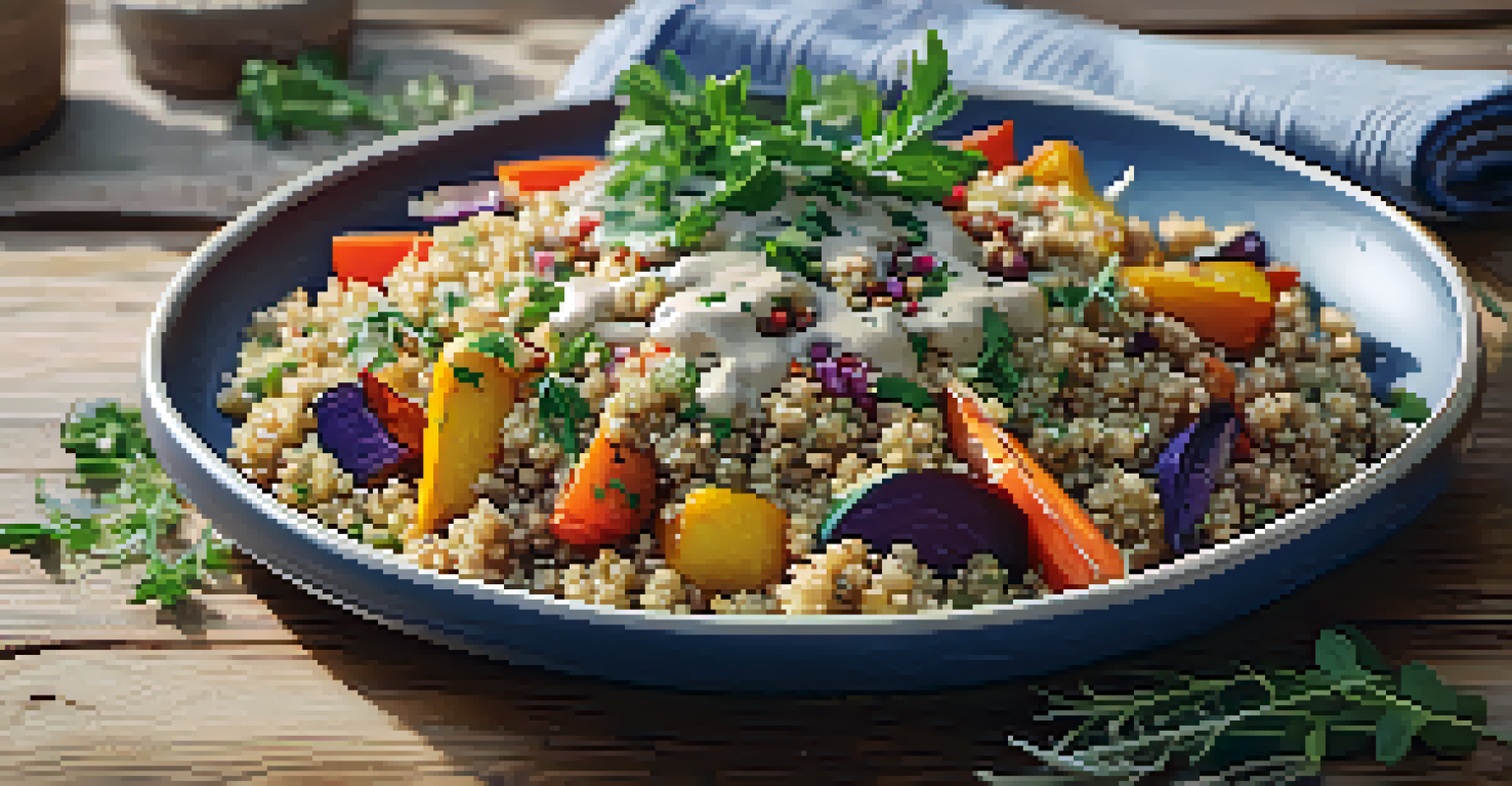The Impact of Nutrition on Cancer Prevention and Recovery

Understanding the Link Between Nutrition and Cancer
Nutrition plays a pivotal role in our overall health, and its influence extends to cancer. Various studies have shown that a well-balanced diet can lower the risk of developing certain types of cancer. For instance, diets rich in fruits, vegetables, and whole grains are associated with a decreased risk of cancer due to their high antioxidant content, which helps combat cell damage.
Let food be thy medicine and medicine be thy food.
Moreover, specific nutrients—like fiber, vitamins, and minerals—can bolster our immune system, further enhancing our body’s ability to fend off cancerous cells. Think of your body as a fortress; the better your nutrition, the stronger the defenses against potential invaders. By choosing nutrient-dense foods, we not only nourish our bodies but also arm them with the tools needed to resist cancer.
Incorporating healthy eating habits into our daily lives can be a proactive strategy for cancer prevention. That means prioritizing whole, unprocessed foods while limiting sugar and unhealthy fats. Small changes, like swapping out a sugary snack for a piece of fruit, can make a significant difference over time.
Key Nutrients for Cancer Prevention
Certain nutrients have garnered attention for their potential cancer-fighting properties. For example, antioxidants such as vitamins C and E, as well as selenium, help neutralize harmful free radicals that can lead to cancer. Including a rainbow of fruits and vegetables in your diet ensures you’re getting a wide array of these beneficial nutrients.

Another important nutrient is fiber, which has been linked to a reduced risk of colorectal cancer. Fiber promotes healthy digestion and aids in the elimination of toxins from the body. It's like a broom that sweeps through your digestive system, keeping it clean and functioning optimally.
Nutrition Reduces Cancer Risk
A well-balanced diet rich in fruits, vegetables, and whole grains helps lower the risk of developing certain types of cancer.
Furthermore, omega-3 fatty acids found in fatty fish, flaxseeds, and walnuts have anti-inflammatory properties that may help reduce the risk of cancer. By incorporating these nutrient-rich foods into your meals, you can take a significant step toward lowering your cancer risk.
The Role of a Plant-Based Diet in Cancer Prevention
Plant-based diets have been associated with a lower risk of various cancers. Rich in vitamins, minerals, and antioxidants, these diets focus on whole foods while minimizing animal products. By prioritizing grains, legumes, and vegetables, you’re not only feeding your body healthier options but also reducing your exposure to harmful substances often found in processed meats.
The greatest wealth is health.
Research indicates that vegetarian and vegan diets may contribute to a lower incidence of cancer due to their high fiber content and low levels of saturated fat. Think of it as choosing to fill your plate with vibrant, life-giving foods instead of heavy, processed ones. This shift can lead to a healthier body, better weight management, and a stronger immune system.
Transitioning to a plant-based diet can be a gradual process. Start by introducing more plant-based meals into your week, such as Meatless Mondays, and explore the variety of delicious recipes available. Each meal is an opportunity to nourish your body and support your health.
Nutrition's Role During Cancer Treatment
During cancer treatment, proper nutrition becomes even more crucial. Treatments like chemotherapy and radiation can take a toll on the body, leading to side effects such as nausea, fatigue, and loss of appetite. A well-planned diet can help mitigate some of these effects and ensure the body receives the nutrients it needs to heal.
For instance, protein is essential for repairing tissues and supporting the immune system. Foods like lean meats, eggs, and legumes can help maintain muscle mass and strength, which is particularly important during treatment. Think of this time as a rebuilding phase, where nutrition acts as the foundation for a stronger recovery.
Plant-Based Diet Benefits
Adopting a plant-based diet can decrease cancer risk due to its high fiber content and low levels of harmful substances.
Hydration is equally important, as it helps combat dehydration and flush out toxins. Staying well-hydrated can alleviate some treatment-related side effects, so incorporating fluids like water, herbal teas, and broths can make a big difference in comfort levels.
The Importance of Nutritional Support for Cancer Survivors
After treatment, cancer survivors may face unique dietary needs that can help them maintain their health and prevent recurrence. Research suggests that a nutrient-rich diet can play a role in reducing the risk of cancer returning. This is where nutritional support becomes essential as survivors navigate their post-treatment journey.
Maintaining a balanced diet rich in vegetables, fruits, whole grains, and lean proteins can help rebuild strength and boost overall well-being. Think of it as fueling your body with the best ingredients to ensure it runs smoothly. Paying attention to nutrition can empower survivors to take an active role in their health.
Moreover, engaging with a registered dietitian can help tailor a personalized nutrition plan that meets individual needs. This support can provide guidance on making healthier choices, managing potential weight gain, and ensuring a balanced intake of essential nutrients.
Foods to Avoid for Cancer Prevention
While it’s important to focus on what to include in your diet, it’s equally crucial to be aware of what to limit. Processed foods, high in sugar and unhealthy fats, can increase cancer risk and should be consumed sparingly. Think of these foods as obstacles on your health journey; minimizing them can help clear the path toward better nutrition.
Red and processed meats have also been linked to certain cancers, particularly colorectal cancer. While it doesn’t mean you must eliminate them entirely, moderation is key. Exploring alternative protein sources, like beans or fish, can provide variety and health benefits.
Nutritional Support for Survivors
Cancer survivors benefit from a nutrient-rich diet that helps rebuild strength and reduce the risk of recurrence.
Additionally, avoiding excessive alcohol consumption is important, as it has been proven to increase the risk of various cancers. If you choose to drink, moderation is the best approach. Being mindful of these dietary choices can significantly impact your overall health and cancer prevention efforts.
Creating a Sustainable Nutrition Plan for Cancer Care
Developing a sustainable nutrition plan involves setting realistic goals and making gradual changes. It’s not about drastic diets but rather about embracing a lifestyle that prioritizes health. Think of it as building a house; the structure takes time, patience, and careful planning to ensure it stands strong.
Start by assessing your current eating habits and identifying areas for improvement. Incorporating small changes, like adding an extra serving of vegetables to your meals or swapping out sugary drinks for water, can lead to lasting results. Each step taken can bring you closer to a healthier lifestyle.

Lastly, don’t hesitate to seek support from health professionals, such as nutritionists or dietitians. They can provide valuable insights and help you create a personalized plan that fits your needs and preferences, making the journey more enjoyable and effective.